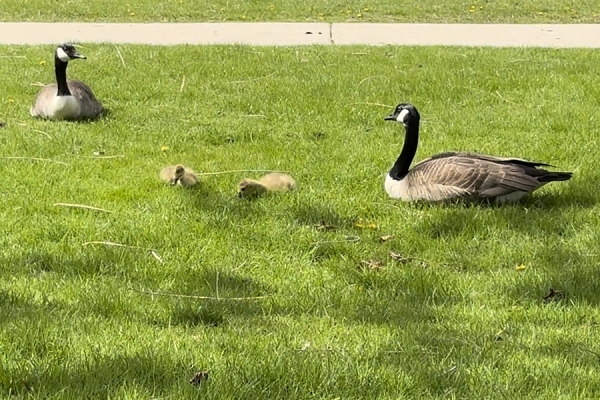 Mother Goose and Father Goose watch over their brood of baby geese on a campus lawn.
Mother Goose and Father Goose watch over their brood of baby geese on a campus lawn.
With Saturday, May 13, marking World Migratory Bird Day, it’s an appropriate time to celebrate our avian friends, says Nadia Harduar, the University’s sustainability officer.
She notes that this year’s theme is “Water: Sustaining bird life” and offers suggestions for ways individuals can help.
“The University of Windsor sits right next to an important waterway which is needed both by humans as well as the wildlife which it sustains, the Detroit River,” Harduar says. “Migratory birds use the Detroit River as a flyway during spring migration, accounting for increase in bird populations flying through Windsor during their time.”
She points out that the reflectivity of glass makes it the second-leading cause of death for birds, who collide with windows. To combat this problem, the University has been installing bird-safe glass on new buildings. The Toldo Lancer Centre and Welcome Centre have small dots on windows to make the glass visible to birds, the renovations to the law building address this issue, and some windows in the Leddy Library are festooned with decals representing the silhouettes of birds of prey.
“However, not all buildings on the University of Windsor’s campus are bird-friendly,” Harduar says. “We can use your help to identify windows that cause bird casualties, through a citizen science initiative to help both migratory and native birds on campus.”
Alysha Riquier, a graduate student of integrated biology, assisted in developing a new form that will enable members of the university community to report bird casualties, to help track and identify where efforts should be considered to make the campus bird-friendly. Fill out the form and submit a photo of the bird and the surrounding area. Grounds staff has already started tracking such incidents, Harduar reports.
She suggests other ways to help: reduce light pollution and decrease pollution to waterways by using reusable water bottles and bags.
Biology professor Dan Mennill heads research into urban avian populations.
“We use acoustic recordings to track bird migration, to study social interactions between birds, and to understand bird mating behaviour,” he says. “We record birds that pass over us during migration, and we have found that artificial light serves as a great distraction to migratory birds. We also record birds in different areas of cities, to understand which aspects of urban green spaces are important for birds.”
Windsor received certification from Nature Canada as a bird-friendly city in June 2022, recognizing work to make it a safe haven for wild birds.
The city will hold its first “Urban Birding Challenge” this week to introduce new birders to discovering nature in urban environments. Spot the most birds in a 24-hour period to compete for prizes. See details here.
